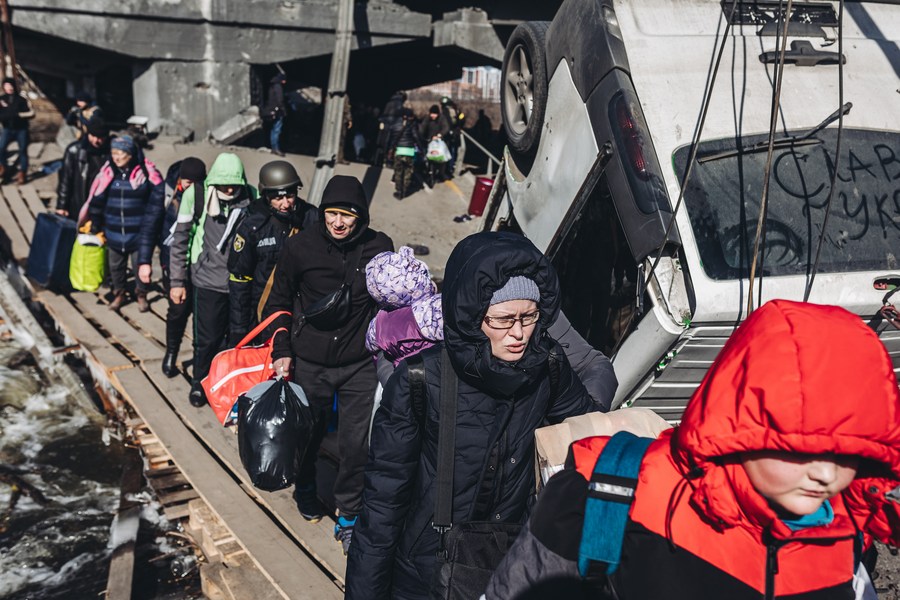The United States has doubled down on a decision to send controversial cluster munitions to Ukraine as part of a new military aid package, setting off sweeping fears over life risks for civilians for decades to come.
The cluster bombs will be a part of a new 800 million-U.S.-dollar military assistance package, which also includes armored vehicles and anti-armor weapons, said the Pentagon on Friday.
Though the highly contentious weapon is widely banned by many countries, including key U.S. allies, Washington continued to hold these munitions in its arsenal and vowed to help Ukraine destroy what it called “heavily dug-in” Russian forces.
Rights groups and many other critics say a significant proportion of the explosive devices are duds that do not detonate but remain on site as dangerous unexploded ordnance, warning that the fallout could be beyond measure.
INCALCULABLE FALLOUT
“Cluster munition scatter small bomblets over a wide area,” said Marta Hurtado, spokesperson for the Office of the United Nations High Commissioner for Human Rights in Geneva. “They kill and maim people years later after the end of a conflict.”
The decision to send cluster munitions marked a watershed moment with the Biden administration agreeing to send a weapon that most countries have agreed should have no place in modern warfare.
For starters, a cluster munition is a type of air-dropped or ground-launched bomb that breaks apart in the air above a target into dozens, and sometimes up to hundreds, of “bomblets” that can scatter over a wide area, known as submunitions.
Due to weather and other environmental factors, cluster munitions can fall often outside of the intended target range, said the International Committee of the Red Cross (ICRC). Although cluster munitions are designed to detonate upon impact, as many as up to 40 percent fail to do so and could explode later if disturbed or mishandled, posing a threat to civilians long after they are dropped, per the ICRC.
As these bombs release massive bomblets that can kill indiscriminately over a wide area, the humanitarian consequences of cluster munitions for civilians can be intense and long-lasting.
Unexploded submunitions “disproportionally” harm civilians, according to the Cluster Munition Monitor, as civilians represented 97 percent of all cluster munition casualties in 2021.
UN Secretary-General Antonio Guterres objected to the use of cluster munitions, his deputy spokesperson Farhan Haq said at a news briefing on Friday, in response to U.S. approval of cluster munitions for Ukraine. The UN chief “does not want there to be continued use of cluster munitions on the battlefield.”
Criticizing the flawed and troubling logic in such a U.S. supply, the New York Times commented in an opinion piece that countries in today’s world have “increasingly sought to draw a red line against the use of weapons of mass destruction or weapons that pose a severe and lingering risk to noncombatants.”
Human Rights Watch said in a report on Thursday that “transferring these weapons would inevitably cause long-term suffering for civilians and undermine the international opprobrium of their use.”
Sarah Yager, the Washington director at Human Rights Watch, called the U.S. move “devastating.”
“They are absolutely awful for civilians,” Yager told Al Jazeera in a television interview. “I think when legislators and policymakers here in the United States see the photos coming back of children with missing limbs, parents injured, killed by our own American cluster munitions, there’s going to be a real awakening to the humanitarian disaster that this is.”

Local residents evacuate from Irpin, Ukraine, March 11, 2022. (Photo by Diego Herrera/Xinhua)
WIDESPREAD BACKLASH
Humanitarian groups have strongly denounced Washington’s decision to supply cluster munitions to Kiev, which can go undetonated and potentially imperil civilians, particularly children, for decades.
Critics say that by authorizing the supply of this controversial weapon, the White House has in effect confessed to committing war crimes.
“It would be the greatest danger for Ukrainians for many years or up to a hundred years if cluster bombs are used in Russian-occupied areas in the territory of Ukraine,” Cambodian Prime Minister Samdech Techo Hun Sen tweeted, urging Ukraine not to use cluster bombs.
A victim of U.S. cluster munitions dropped in the early 1970s, Cambodia today still grapples with deadly war remnants. “As my pity for the Ukrainian people, I appeal to the U.S. president as the supplier and the Ukrainian president as the recipient not to use cluster bombs in the war because the real victims will be Ukrainians,” he said, recalling the painful experience of his country.
The decision is another blatant manifestation of the U.S. aggressive policy against Russia, aimed at “prolonging the conflict in Ukraine to the maximum term and the war until ‘the last Ukrainian’,” Russian Foreign Ministry spokeswoman Maria Zakharova said in a statement on Saturday.
Now, anger has been building over Washington’s latest move to provide Ukraine with the weapon widely banned by more than 100 countries, including key U.S. allies. Even within NATO, members said while they, as always, side with the U.S. helping with the legitimate defense of Ukraine, they object to the U.S. supply of this high-condemned weapon.
Canada objects to the use of cluster munitions that Washington has promised to give Ukraine for its counteroffensive against Russian forces, Ottawa said on Saturday.
New Zealand’s Prime Minister Chris Hipkins said he will tell Ukrainian President Volodymyr Zelensky of New Zealand’s opposition to cluster bombs if the pair meet this week at the NATO summit scheduled from Tuesday to Wednesday.
Also on Saturday, British Prime Minister Rishi Sunak said Britain discourages the use of cluster munitions, and Spain’s Defense Minister Margarita Robles also said “no to cluster bombs.”
Some U.S. lawmakers have also dissuaded the Biden administration from such a decision, arguing that their humanitarian costs outweigh their benefits on the battlefield, calling it “unnecessary and a terrible mistake.”



